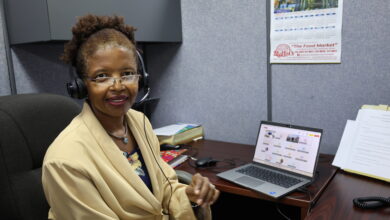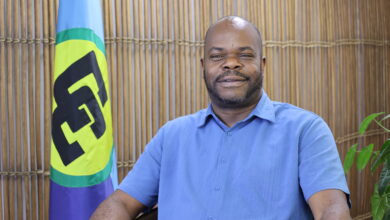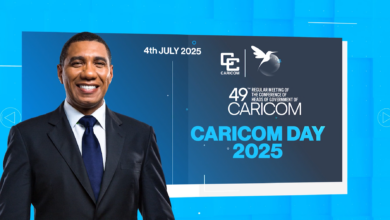Mr. President,
The Caribbean Community deeply appreciates this opportunity to address the Security Council on the situation in Haiti.
One year ago, we were all gravely concerned about deteriorating political and security conditions in Haiti. With Haitian agreement and international support, the Caribbean Community launched a diplomatic initiative. Underpinned by the principles of democracy and good governance enshrined in the CARICOM Charter of Civil Society and the Inter-American Democratic Charter, the CARICOM initiative sought the following:
– To stabilize the political situation through a power-sharing arrangement;
– To avoid the repetition of the traditional Haitian practice of getting rid of the President by any means in order to resolve political conflict; and
– To help the Haitians find a pacific and political solution which would preserve the rule of law and constitutional continuity.
Unfortunately, on 29 February 2004, the “quick fix” was in and principle thrown out. CARICOM Heads of Government were disappointed by the reluctance of the Security Council to take immediate action in response to appeals for assistance by the Government of Haiti and to the request of the Caribbean Community. The elected President departed the country in circumstances still to be elucidated. An interim administration was subsequently put in place using some of the elements outlined in the CARICOM Prior Action Plan.
However, in the view of CARICOM, the fundamental tenets of democratic practice and behaviour had been compromised. We cannot vacillate on principle since it is essential to our security as small states. Continuing violations of the principles laid down in the CARICOM Charter of Civil Society have made it impossible for the Community to receive representatives of Haiti in its Councils. The interim administration must be held to internationally recognized standards with regard to respect for fundamental civil and political rights, due process and the rule of law.
Allegations of egregious abuses at the hands of the police must be fully investigated. The prolonged detention of Lavalas leaders and activists without trial or charges, can only be construed as arbitrary detention on the basis of political affiliation. Such persons should be released forthwith. This serious breach of fundamental rights is exacerbated by a persistent failure to prosecute the “rebels” for their criminal activity. Such an approach also hinders the establishment of an enabling political climate without which peace and security cannot be sustained.
CARICOM remains committed to the people of Haiti. To this end, the Caribbean Community put in place mechanisms such as an Assistance Programme of which electoral support is a key component.
Mr. President,
One year later, the deep concerns of the Regional and International Communities have increased. The inability of the Interim Administration to promote stability and political inclusiveness has been a stumbling block to progress. Insecurity and volatility persist. The lot of the ordinary Haitian has not improved. The traditional clamour for a change in government is once again being raised. Hopelessness and joblessness combine with the easy availability of weapons to fill the ranks of the illegally armed groups. They proliferate on both sides of the divide. Their activities, whether criminal or political in intent, subvert the authority of the state and must be curtailed. Instability has an adverse effect on Haiti's neighbours, including The Bahamas and Jamaica, as it spurs illegal immigration and, increasingly, trafficking in small arms and drugs.
Mr. President,
The November report of the Secretary General on MINUSTAH rightly underlines the need for increasing the capacity of the Stabilization Mission to implement disarmament, demobilization and reintegration. This must be a priority. Those who foment and engage in violence must be prosecuted.
The disbursement of donor pledges is urgently required to help alleviate the desperate social and economic situation. It is to be hoped that the recent release of funds by the World Bank will be replicated by other major donors. Coherence and mutual reinforcement must also be ensured between the humanitarian, security, political, and developmental strategies. They must also be informed by the harsh realities of the Haitian environment.
Mr. President,
Free and fair elections are pivotal for returning to constitutional rule. They are however only a critical way station on the long and arduous road to stability, recovery and a viable democracy. It is clear that the daunting pre-requisites for credible elections later this year are not yet within grasp. Our joint and urgent task must be to help create a secure environment that permits open campaigning; to help ensure a political climate that facilitates the participation of all political groups which reject violence, including those currently outside the political and electoral process; and to help establish an effective administrative structure to conduct proper elections.
Mr. President,
As the difficulties of the transition process mount, the concepts of national dialogue and bridge-building are being increasingly advocated from within Haiti. Domestic attempts to make the idea of bringing together a representative cross-section of Haitian society a reality must be encouraged. In this connection, the Caribbean Community commends the exploratory efforts of the Special Representative of the Secretary General.
Defusing tensions, identifying common and unifying interests, promoting inclusiveness, and building confidence are urgently required societal building blocks. They could facilitate a way forward on sensitive and contentious issues such as security, disarmament, development paths and priorities, and elections. Ultimately, the responsibility for creating favorable conditions for reconciliation, recovery and stability lies with the citizens of Haiti themselves.
Mr. President,
The building of democracy in Haiti and the creation of a stable political, social and economic order require the long term commitment of the Haitians and of their partners in the international community. The Caribbean Community salutes the key role played by Latin American States within MINUSTAH as well as the other contributing states. It also recognizes the supportive efforts of the Organisation of American States. As circumstances permit, CARICOM makes its own contribution to the stabilization and rebuilding efforts of the United Nations in the sister country of Haiti.
I thank you, Mr. President.





